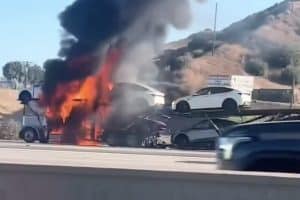Tesla (NASDAQ: TSLA) bulls are responding to “The Big Short” Michael Burry’s massive bet against the electric automaker’s stock, indicating that their beliefs don’t align with the man who correctly predicted the 2008 collapse of the housing crisis.
Yesterday, a 13-F Filing with the SEC revealed that Burry has puts against over 800,000 shares of Tesla. The details of the puts, like value, strike price, or expiry, are unknown, and the filling only details the number of shares that Burry has puts against.
However, Tesla bulls like Gene Munster of Loup Ventures and Pierre Ferragu of New Street Research aren’t aligning with Burry’s consensus on the stock.
Burry believes that Tesla’s stock is highly reminiscent of the housing market in 2007, just a few months before the crash that led to the first recession in the American economy in twenty years. The previous economic downfall occurred in 1987 when “Black Monday” struck, and stock markets around the world fell apart. Burry has told Tesla investors to “enjoy it while it lasts” and notes that the housing bubble also gained massive value in 2007 before falling apart in September 2008.
Betting against Tesla stock is a risky option, Munster believes. Tesla shares increased in value by over 700% last year, and while 2021 hasn’t yielded the same results, Munster’s analysis reveals that things like tax credits for owners can only lead to bullish outlooks for the automaker’s stock.
Munster believes the reintroduction of a $7,000 EV tax credit could be one of the biggest pieces of the bull story for Tesla in 2021. “In my view, it should be part of the bull thesis,” Munster said to CNBC’s Squawk Box. “I don’t think we’re at anything close to ending these tax credits. They will likely get restarted again for Tesla owners.”
Tesla lost its ability to offer a $7,000 EV credit after it surpassed the 200,000 vehicle threshold years ago. GM is the only other automaker to achieve this and have the tax credit expunged from its purchases, mostly due to the popularity of the Chevrolet Bolt EV.
Munster also reminds those who are focused on Tesla’s sub-par 2021 run that the stock is up considerably over the past twelve months. “The stock is still up a lot over the past year. It was $160 twelve months ago.”
Meanwhile, other bulls, like Pierre Ferragu, didn’t comment directly on Burry’s opinions of Tesla stock but did state that the “return on operating assets” is Tesla’s “bullet-proof metric.”
“We hear a lot of comments about Tesla’s profitability (or lack thereof),” Ferragu writes. “They usually happily mix considerations about gross margin, segment results, exceptional or financial items, regulatory credits…and rarely make any sense. Tesla builds factories to manufacture cars and sells them. As a result, the only appropriate way to evaluate its operational profitability is to look at cash return on operating assets: out of a dollar of assets immobilized in the group, how much cash can Tesla generate in one year.”
Ferragu says Tesla broke even in Return on Assets in 2018, and in 2020, the company got a 20% cash return. He sees this increasing to 40% in 2023 as new factories in Germany and Texas will increase Tesla’s cash generation as the Return on Assets continues to improve.
At the time of writing, Tesla shares were trading at $589.44, up 2.16%.





